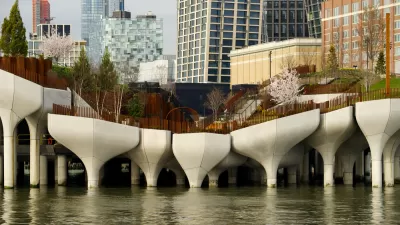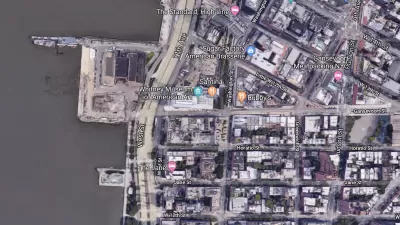Wealthy private donors take the lead in developing New York City projects, such as parks, writes Carol Berens, an architect, author, and real estate agent.
With New York City and other urban communities facing tight budgets these days, private donors are stepping up to spearhead improvement efforts, especially in parks.
One recent example of this is a $170 million proposed public park in the form of a floating island to be part of Hudson River Park designed by and paid for by wealthy, power couple Barry Diller and his wife, fashion designer Diane von Furstenberg.
In New York, the success of private money supporting public functions was demonstrated with the formation of the Central Park Conservancy, a group that raised private funds to turn the fortunes of that New York City landmark around and now is responsible for more than 75 percent of the park’s annual expenses and all of its improvements.
“Throughout America, cities have relinquished responsibility to build and maintain their public spaces, ceding that authority to independent managers and single-purpose organizations. As a result, the bike paths and clean benches in parks that serve the city at large, especially those in wealthier neighbors, are beacons of civic pride while the basketball courts and sliding ponds of many neighborhood parks remain sad indicators of urban neglect.”
While many have raised concerns about private entities taking over publicly-funded projects, city-generated funds for local use are discretionary, forcing a variety of projects to compete for those ever elusive dollars.
FULL STORY: West Side Story

Alabama: Trump Terminates Settlements for Black Communities Harmed By Raw Sewage
Trump deemed the landmark civil rights agreement “illegal DEI and environmental justice policy.”

Study: Maui’s Plan to Convert Vacation Rentals to Long-Term Housing Could Cause Nearly $1 Billion Economic Loss
The plan would reduce visitor accommodation by 25% resulting in 1,900 jobs lost.

Planetizen Federal Action Tracker
A weekly monitor of how Trump’s orders and actions are impacting planners and planning in America.

Wind Energy on the Rise Despite Federal Policy Reversal
The Trump administration is revoking federal support for renewable energy, but demand for new projects continues unabated.

Passengers Flock to Caltrain After Electrification
The new electric trains are running faster and more reliably, leading to strong ridership growth on the Bay Area rail system.

Texas Churches Rally Behind ‘Yes in God’s Back Yard’ Legislation
Religious leaders want the state to reduce zoning regulations to streamline leasing church-owned land to housing developers.
Urban Design for Planners 1: Software Tools
This six-course series explores essential urban design concepts using open source software and equips planners with the tools they need to participate fully in the urban design process.
Planning for Universal Design
Learn the tools for implementing Universal Design in planning regulations.
Caltrans
Smith Gee Studio
Institute for Housing and Urban Development Studies (IHS)
City of Grandview
Harvard GSD Executive Education
Toledo-Lucas County Plan Commissions
Salt Lake City
NYU Wagner Graduate School of Public Service




























